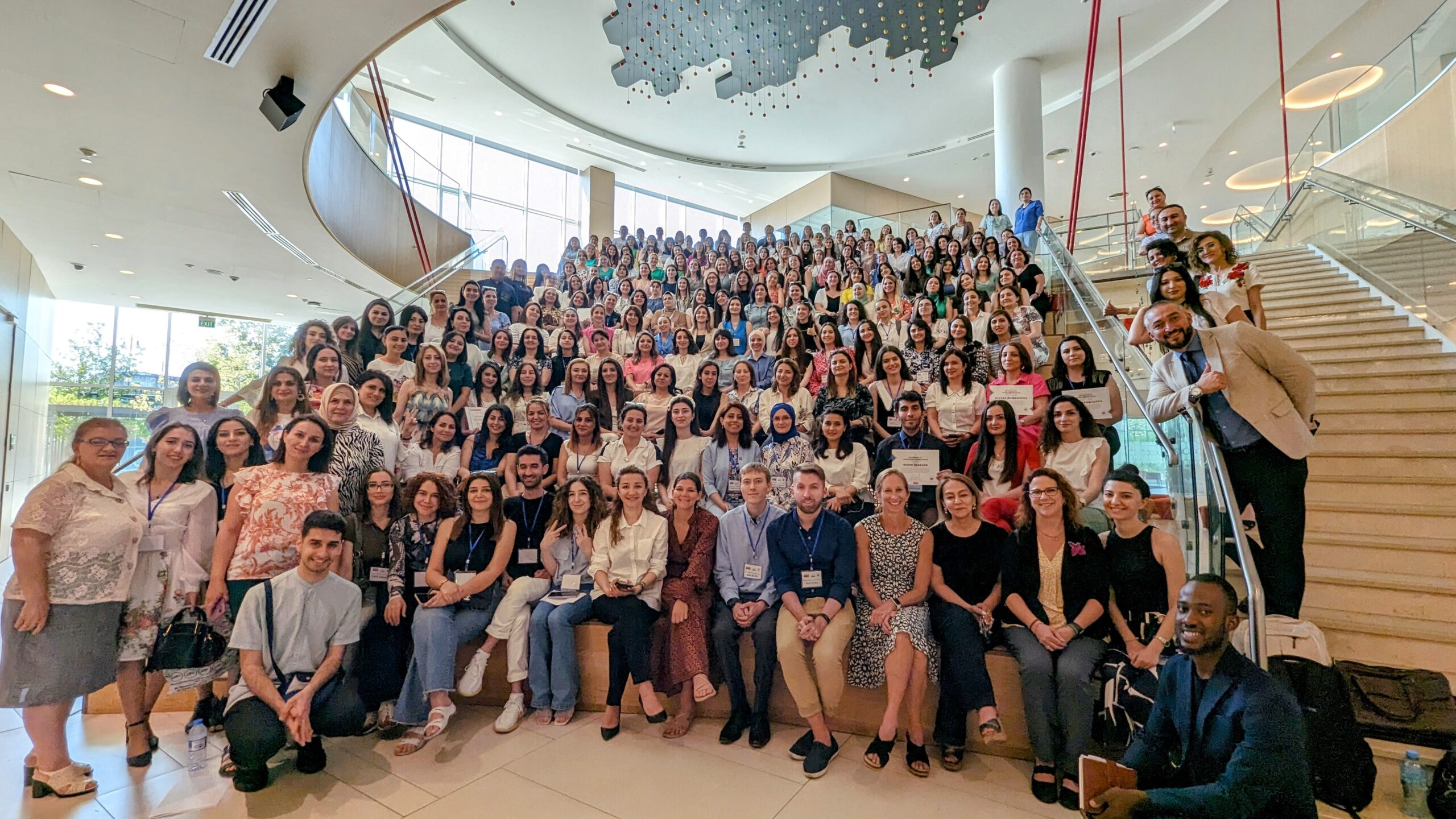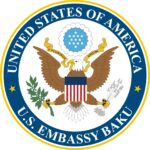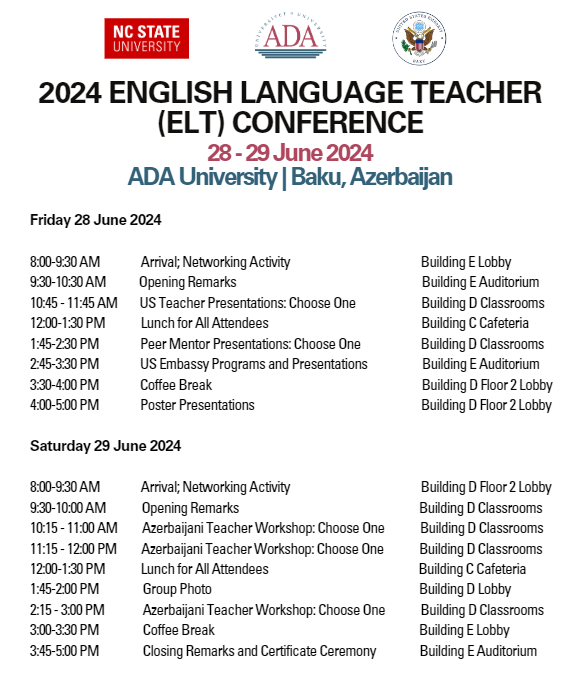
English Language Teacher Conference
Baku, Azerbaijan

2024 ELT Summer Conference: 28-29 June
Special workshops for the 2024 ELT Cohort on 27 June
North Carolina State University is pleased to present the English Language Teacher Conference at ADA University in June of 2024. English Teachers are invited to learn from workshops and posters presented by peers who have completed our U.S. Embassy sponsored program.
Registration for the 2024 ELT Conference has closed. You may contact Becky Cibulskis, rcibuls@ncsu.edu, with questions.

2024: US Teacher Presentations
Challenges and Benefits: Strategies for Effective Teacher Collaboration
Adrienne Shank | Room E Auditorium
Collaboration can be difficult. This session will present recent findings on the challenges and benefits of teacher collaboration, as well as discuss best practices for implementing effective collaborative processes. Participants will have an opportunity to share their own experiences as well as brainstorm ways of creating a culture of collaboration in schools.
Metacognition; Let’s Think about That!
Cate Madden | Room D207
This interactive presentation highlights the importance of using metacognitive activities in the K-12 English classroom. Terminology will be defined, benefits will be identified, and simple metacognitive strategies for all grade levels will be discussed. Participants will leave with links to planning, assessment, and reflection tools designed to help students become more independent and confident learners.
Practical Strategies to Apply Differentiation in the English Language Classroom
Paula Wilder | Room D107
This presentation explores differentiation in English language teaching, focusing on content, process, product, and environment. Practical activities are suggested to enhance classroom engagement and support diverse learners’ needs. Participants will gain strategies for effective differentiation with the intent to create a more inclusive and dynamic learning experience for English language learners.
Teacher Collaboration Across Azerbaijan
Tiffany Tillman | Room D208
This workshop is designed to enhance teacher collaboration among English language educators in Azerbaijan, highlighting the importance, methods, and benefits of collaboration through structured and informal approaches. It incorporates real-life case studies from Azerbaijan to illustrate successful collaboration in different teaching environments with interactive activities and resources to foster practical, sustained engagement.
Building and Leading Effective Teaching Circles
Anne Cannon | Room: D108
Learn the steps to form and lead a successful teaching circle, including establishing leadership and creating an action plan. This session will discuss various leadership models, the importance of collaboration, including interdisciplinary collaboration, and methods for exploring teaching and learning issues. Attendees will leave with practical guidance on starting and sustaining their own teaching circles.
2024: Peer Mentor Presentations
Effective Strategies for Bilingual Teachers in English Language Instruction
Kamala Aliyeva, Vəfa Salehova | Room: D207
Bilingual teachers play a crucial role in English language education. Strategies such as creating a supportive atmosphere, incorporating native language, project-based learning, and integrating drama techniques are essential for fostering language acquisition and student engagement. These methods enhance multiple intelligences while addressing individual learning needs, ultimately preparing students for a globalized world.
Enhancing Learning Through Multiple Intelligences Theory
Günel Tahir Eminli, Leyla İsmayilzadə | Room: D208
This workshop explores Gardner’s Theory of Multiple Intelligences, substantiated by foundational research (Gardner, 1983) and further implementations in educational practices (Armstrong, 2000). It highlights the theory’s effectiveness in promoting inclusive education, as demonstrated by successful adaptations for students with disabilities (Kornhaber, 2004).
Exploratory Action Research (EAR)
Sübhi İlyasov, Türkan Heydərova | Room: D107
Most teachers in Azerbaijan worry about problems in the classroom but lack understanding of how to articulate or remedy them. Exploratory Action Research, which is based on a large body of reliable research, may assist them by giving recommendations and providing assistance to secondary school teachers who are conducting teacher research in their own classrooms.
Global Citizens: Service Learning Integration in English Language Classroom
Aisha Ahmadova, Gunay Akbarova | Room: D108
In today’s globalized world, the role of education goes beyond language proficiency to promote global citizenship and social responsibility. This abstract investigates service learning implementation in the English language classroom as a transformative approach to language teaching. Service learning allows students to apply language abilities while solving real-world issues.
2024: Poster Presentations
Building the speaking habit, Vusale Bayramova, Shalala, Gulnara Mirishili
English is taught as a foreign language in our country , so most students not only have difficulty in speaking the language but also avoid speaking it as they are afraid of making mistakes. In this presentation , participants will get information about building the speaking habit and carrying out a metacognitive strategy.
Centering the teacher to provide personalized instruction in the digital age, Parvana Nesirzade, Malak Semedzade, and Sevil Shirinova
Teachers are like artists creating masterpieces through their lessons. However, they can sometimes focus too much on certain colors and lose sight of the big picture. Let’s discuss together the ways for teachers to maintain balance in their teaching methods to keep their work strong and effective.
Challenges teachers face in an inclusive classroom, Matanat Valiyeva and Khayala Asadova
Due to misconception about the challenges of language learning, foreign language classrooms have not always been accessible spaces for all learners. This proposal seeks to address the needs of teachers to teach EFL to the students with special educational needs or disabilities, foreign learning classrooms and challenge the notion that this group of students cannot or shouldn’t learn languages. Though little research considers the language learning experiences of children with SEND, it shows that second language acquisition is not only possible, but positive for many learners with additional needs.
Digital Learning and Technologies in Teaching English, Lala Mardanova, Aynur Abbasova, and Sevinc Muradova
The poster highlights digital learning and technologies in teaching English. Educational technology has changed the way teachers teach English in the classroom. They now have a range of tools and resources that enhance the learning process. Teachers can provide interactive multimedia resources and foster communication and collaboration among students.
Teacher education, Ayshen Rzayeva, Lamiya Quliyeva, and Ayten Gasimova
Teacher education or teacher training refers to programs, policies, procedures, and provisions designed to equip (prospective) teachers with the knowledge, attitudes, behaviors, approaches, methodologies and skills they require to perform their tasks effectively in the classroom, school, and wider community. The professionals who engage in training the prospective teachers are called teacher educators (or, in some contexts, teacher trainers).(https://en.wikipedia.org/wiki/Teacher_education) So, in this session we’ll speak about the importance of teacher education.
Teaching speaking through games, Esmer Kazimova and Aynur Rahimli
Incorporating games into speaking lessons can make learning more enjoyable and effective. Games provide opportunities for students to practice speaking in a relaxed environment, helping to improve fluency, vocabulary, and pronunciation. Plus, they foster engagement and teamwork among students, making the learning process more dynamic and enjoyable.
Teaching vocabulary & grammar creatively, Gunay Tagıyeva, Sura Rustamova, and Afsana Salimova
We think teaching vocabulary & grammar doesn’t have to be dull or book-based. Students have to be motivated by interesting activities which inspires them to learn deeply and fast.We investigated creative methods to achieve this teaching process.
The effective ways of teaching grammar and vocabulary, Esmira Abdullayeva, Kemale Sheybova, and Laman Alizadeh
Teaching vocabulary and grammar sometimes is boring for children. We’ll show some deep innovative methods for teaching grammar and vocabulary with games, activities and creative exercises that can make learning these skills more engaging. These approaches help teachers create a more interesting and effective learning experience for students, making it easier for them to grasp and remember what they learn.
The role of the pictures in the learning vocabulary, Sabahat Agayeva and Aynura Mirzayeva
Instructors have reported that their use of images in the classroom has led to increased student interactivity and discussion. Popular language-learning programs teach vocabulary with visuals – meaningful pictures and other visual cues kids can easily relate to. Similar strategies can be very effective in the classroom when students are learning words and concepts that are new to them.
Ways of improving teacher professional development, Saraybika Gasimova and Parvana Shikhiyeva
This presentation highlights how educators can adapt their teaching styles and pursue ongoing professional development and provides information about an international educational program for teachers (North Carolina State University Certificate Program). It offers insights from research findings, providing English language teachers with clear tips for enhancing their professional growth.
WEB 2 tools in the ESL students’ Metacognitive Skills development, Arzu Maharramli, Mahsati Mammadova, and Irada Gurbanova
Web 2.0 technologies are meant to minimize the stress of school and turn it into an environment that encourages personalized learning methods so that students may grow and learn better. It is recommended to use learner-centered instructional methods. This poster explores how Web 2.0 tools like Prezi, StoryJumper, Mentimeter, and Zumpad enhance metacognitive skills in ESL students through self-assessment, collaboration, and interactive learning, offering innovative methods to improve learning outcomes.
2024: Azerbaijani Teacher Workshop Presentations
| Classroom Management Techniques to Deal with Challenging Students | Challenging student behavior significantly affects educational environments and outcomes. This proposal targets disruptive behaviors, including aggression, lack of preparation, disengagement, attention-seeking, flattery, and frequent excuses. Through movie clips and interactive discussions, the session offers strategies for identifying and managing these behaviors. Practical tips aim to foster inclusive, productive learning cultures. | Rashida Hagigatli, Mina Hasanli, and Khavar Maharramova D208 |
| Consonant Clusters Word Building in the Development of Oral Speech Skills | Conversation is one of the most important features in the interactive learning process; however, word pronunciation can cause difficulties for students. A crucial role of the teacher is to introduce new language and engage students. During this practice-oriented session, teachers will practice interactive games for improving students’ oral speech. | Gunel Alakbarova, Adile Aliyeva, and Nurtan Mammadova D107 |
| Exploring Movies as a Tool in Language and Culture Learning | As educators of intercultural communication, films can provide content and meaning to classroom discussions. This session will demonstrate that integrating videos can provide useful examples to students of different communication techniques. The presenters recommend that teachers move away from basic discussion to incorporating visual aids when discussing language and culture. | Aliyeva Melekmenzer and Natiga Gurbanova D209 |
| Harnessing Artificial Intelligence Tools to Improve Writing Instruction | Rapid technological development of the world requires education systems to adapt in order to improve the quality of education. The latest breakthrough is the introduction of Artificial Intelligence (AI). This presentation explores AI’s role in transforming writing instruction. It aims to personalize learning, offer immediate feedback, and improve teaching methods. | Laman Alizada, Ruziya Hesenova, and Khataya Jafarova D108 |
| Metacognition as a Necessity of Today’s World for Language Learners | This workshop encourages the audience to dive into the depth of metacognition, which enhances personal capacity for self-regulation and managing one’s own motivation for learning. By participating in this presentation, attendees will learn strategies to boost their students’ independent learning by experiencing these principles as active participants in the session. | Tahirova Gunel and Ahmadova Aygun D207 |
| A Multiple Intelligences Approach to Vocabulary Teaching | Vocabulary must be taught but not every student learns vocabulary words in the same way. This session provides the teachers with an opportunity to learn how to teach vocabulary according to multiple intelligences. | Lamiye Mahmudova, Nergiz Mecidova, and Aygun Allahyarova D208 |
| From Passive to Active: Utilizing Metacognitive Activities for Better Listening Comprehension | Listening is a receptive skill that is crucial to develop in foreign language classrooms. Metacognitive awareness is a cognitive evaluation of students’ impressions of themselves during listening activities. The purpose of this presentation is to discover what metacognitive strategies are helpful for learners in their listening performances. | Nihal Hasanova, Dilek Guseynova and Tahira Sadigova D207 |
| Teaching English Using Engaging and Relevant Topics | Azerbaijan’s declaration of 2024 as the “Green World Solidarity Year” offers opportunities to both interest and challenge students. In this session, presenters will demonstrate how combining English language learning with environmental education through real-world scenarios can be fundamental in guiding students toward a more successful, responsible role in the world. | Nicat Ahmadov, Elmira Agayeva, and Efsane Huseynova D108 |
| Teaching Vocabulary and Grammar Effectively in a Student-centered Classroom | Knowing grammatical rules better than native speakers and learning thousands of words from a dictionary is not enough if it is not applied to real life conversations. The aim of this presentation is to discuss how to replace traditional methods with engaging and effective ones and how to apply knowledge to practice. | Madina Abdullayeva, Gunel Jafarova, and Parvana Narimanova D209 |
| Total Physical Response (TPR): Enhancing ESL Speaking Through Action | This session will highlight the potential of the Total Physical Response method to make language learning more dynamic and engaging. Research shows that TPR not only improves understanding and memory of the language, but also reduces students’ anxiety, making learning more enjoyable. Participants will leave with strategies to incorporate TPR into their classroom. | Manzar Mirzazada, Kamala Mammadova, and Dunya Tahmazova D107 |
| Boosting ELLs Communication Skills Through Effective Role-Play Techniques | Bridge the communication gap and unlock ELL fluency! This workshop empowers teachers with interactive and effective role-play activities to boost ELL confidence and foster student-driven practice for diverse proficiency levels. We will focus on student centered learning for real-world communication. | Jamila Nabiyeva, Arzu Abbasova, and Esmira Mukhtarova D107 |
| Enhancing Student Success: Practical Strategies for Writing and Reading Comprehension | This presentation aims to enhance students’ storytelling and critical thinking skills for upcoming exams, while also improving reading comprehension abilities. By teaching the picture-to-story task format and reading strategies like skimming, scanning, and inferencing, we aim to develop versatile writing abilities and foster language proficiency, creative expression, and critical thinking. | Vusala Asgarova, Afat Bashirova and Konul Maharrami D109 |
| Formative Assessment Made Easy: How to Effectively Gauge Student Learning | It can be difficult to discover the knowledge of students while they are still in the learning process. Correct assessment is important for teachers. The teacher must anticipate which students are ready to progress and which need a different path. This workshop aims to inform teachers to implement formative assessment effectively and quickly. | Fidan Majidova, Aytan Guliyeva, and Durdana Karimova D207 |
| Teaching English Grammar With Story-Based Technique | Teaching grammar can be tedious, requiring students to remember rules and drill grammar structures. This presentation will demonstrate how storytelling, proven to be one of the best techniques, can make the process easier and enhance student interest in the language-learning process. | Konul Burzuyeva, Aysel Burjaliyeva, and Sevinj Talibova D208 |
| Utilizing Technology through Apps and Online Tools in ESL Classrooms | Utilizing technology in the ESL classroom provides an opportunity to make classes more engaging, collaborative and inclusive for students. This session will encourage discussion on devices and apps that participants are currently using and will allow time for teachers to try out a new tool that they can use in their daily teaching. | Sabina Najafova, Gunel Bayramova and Manzar Shabanova D108 |
Previous Conference Materials
2023 Baku Conference Repository
The 2023 ELT Conference was held in Baku Azerbaijan at ADA University. Thank you to the 405 English teachers in Azerbaijan who were able to join us for shared professional development.
- 2023 Poster Presentations
- 2023 Organizer Presentations (U.S.A. visitors)
2022 Baku Conference Repository
The 2022 ELT Conference was held in Baku, Azerbaijan, and broadcast via Zoom 28-30 June. The event featured workshops led by NC State University faculty and conference presentations from selected program participants.
- 2022 Teacher Trainer Presentations (YouTube)
2021 Virtual Conference Repository
The 2021 ELT Virtual Conference was held via Zoom Webinar 16-17 November 2021 and featured top participants from the inaugural cohort of participants in the NC State University ELT Azerbaijan program.
- Welcome Remarks (Access Password: fB1jd01*)
- Topic 1: Gultan Majidova; Ruhiyya Mahmudova – Teaching Vocabulary Through Songs, Games, Movies, and other Fun Activities
- Topic 2: Khanim Gasimova, Gulnura Nazarova, Fazila Guliyeva – Increasing Reading Comprehension Through Before, During, and After Reading Strategies
- Topic 3 (Access Password: 7z3U##E8): Elnare Isgenderova, Ulviyye Bahramova, Shebnem Israyilova – Integration of cognitive strategies and technology into lesson planning
- Topic 4: Raifa Valiyeva, Parvina Eyvazova, Shahnaz Abdullayeva – Boost learning and effective teaching through online resources and applications
- Topic 5: Salima Hasanova, Aygun Mutalibova and Gulnara Mammadova – Helping Learners Write More Confidently Through Brainstorming Activities
- Topic 6 (Access Password: &B0RquR$): Narmin Najafova; Vafa Xudiyeva – Lowering The Affective Filter for English learners in Azerbaijan
- Topic 7: Latifa Azimova, Turan Zakariyayeva, Orkhan Jafarov – Teachers’ Role in Motivating EFL learners at school
- Topic 8: Tural Salamov; Naila Latifova; Salihat Kutlasova – Teaching Grammar For All Ages Without Using the Native Language
- Topic 9: Natavan Gojayeva, Gulnar Mammadzada, Gunel Aqil-Mammadova – Giving Effective Feedback on Writing
- Topic 10: Farida Orujova, Kamilla Kravchenko, Rahile Rehimova – Learner’s autonomy – Sherlock Holmes Approach
- Concluding Remarks (Access Password: 9ZR$L4rg): begins at 1hr 5 min (1:05)
ELT Certificate Program
This NC State program is designed to enhance the quality of English language teaching in Azerbaijan and foster a professional network of peer educators.